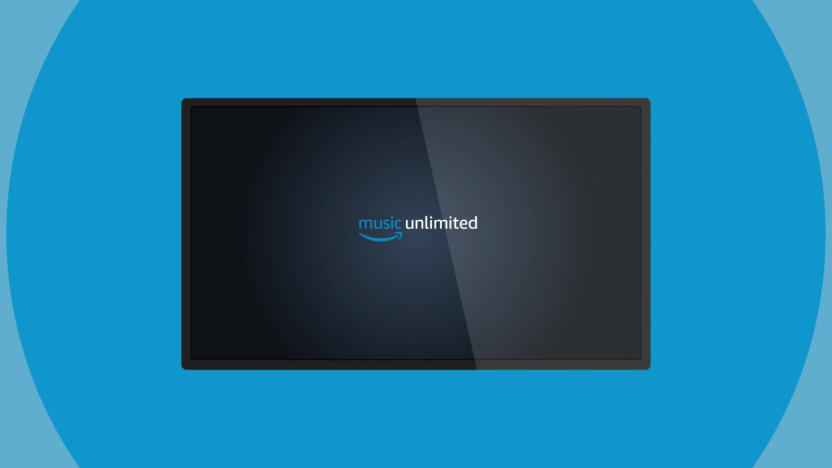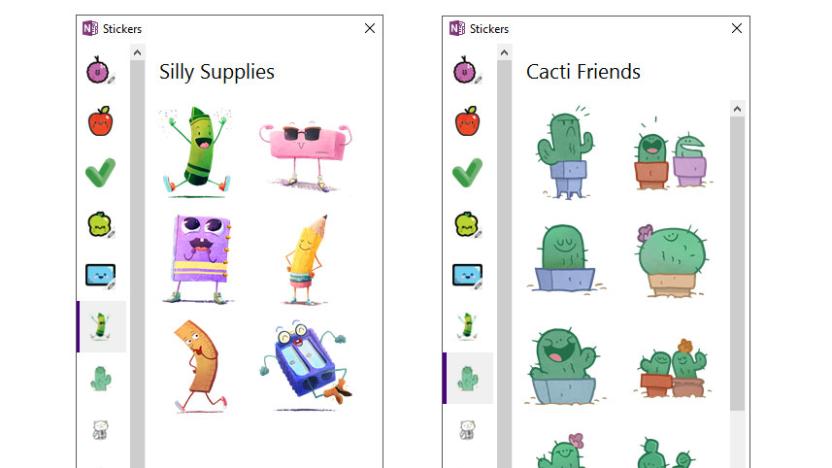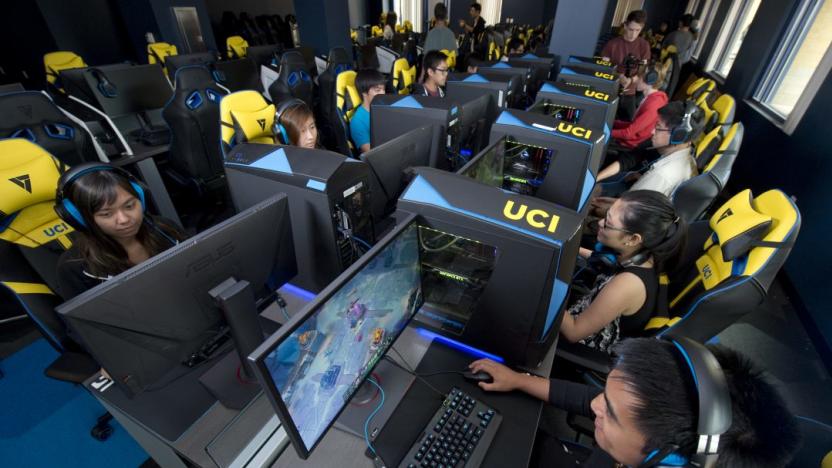students
Latest

College students can pay for Amazon Prime by the month
Amazon is no stranger to discounting its services for college students. You've still had to pay for Prime by the year, however, which can seem wasteful if you're only on campus for some of the year. Thankfully, you won't have to pay more than you have to. Amazon has introduced a by-the-month option for students that asks you to pay $5.49 per month only for as long as you need it. If you don't need fast shipping when you leave for summer break or have no inclination to watch The Tick during exams, you can put that money to better use.

Amazon Music Unlimited is now cheaper for students
Sigh, it's that time of the year again. Despacito may still be atop the charts, but summer is dwindling, meaning it's time to head back to school. But, don't cut short your soundtrack just yet, because this is the ideal time to get ad-free music on a streaming service. All the students out there already get a nice discount on Apple Music and Spotify, and now you can add Amazon Music Unlimited to that list too. The online retail giant is offering up its relatively new music streaming service to all the young folk for just $4.99/£4.99 per month. That brings it in line with its bigger rivals, price-wise at least. It also means you fork out less than Amazon Prime subscribers ($7.99/£7.99 per month) and non-Prime customers ($9.99/£9.99). And, if you're eligible to be a Prime Student member, it will go down to just $6/£6 for six months -- that's just one dollar or pound a month for the period.

EE tempts students with a free 500MB 'data safety net'
Most students are currently enjoying their summer away from the rigours of university life, and EE has decided to give them one more thing to feel happy about. The provider has introduced a new perk for those in higher education it calls a "data safety net." Any student on a two-year handset plan or 12-month SIM-only contract can now claim 500MB of free data each month, which kicks in once they've exhausted their regular monthly allowance.

Microsoft wants OneNote to be the go-to classroom app
Microsoft has been quietly focusing on the education market with its OneNote app for some time now. It's offered free Office 365 subscriptions for students, an integrated math tutor and a classroom-centric add-on called OneNote Class Notebook. The company has just updated OneNote with even more educational extras, including improvements to Notebook, new learning tools and some fun new stickers that teachers and students can use to spice up their collaborations.

Google gives students interactive tools for STEM and internet safety
Google launched a new browser-based Google Earth this past April, adding educational tools to make it easier for teachers to show the world off to students without having to leave the classroom. The company also collaborated with the BBC to create a digital storytelling platform called Voyager that helps curate the discovery of various places of interest around the globe. Google is taking things even farther today at the International Society for Technology in Education (ISTE) conference, announcing a bevy of new tools and virtual experiences to empower students.

A Paris school is using AI to monitor distracted students
For those of us who zone out during university lectures, the temptation multiplies when you taking classes from home. Next fall, a business school in France will try to stop online students from getting distracted with an AI app called Nestor. To judge your level of attention, it can track your face and eyes and even detect when you pull out a phone. If you start to slack off, it can warn you via pop-up messages or emails, and tell you roughly when you may drift away again.

High school students open-source Shkreli's pricey HIV drug
Australian high school students have done "a little Breaking Bad" by synthesizing and effectively open-sourcing the drug famously hiked 5,000 percent in price by "pharma bro" Martin Shkreli. The drug they recreated, Daraprim, is used to treat infection caused by malaria and HIV and without it, many patients would die. "Working on a real-world problem definitely made us more enthusiastic," said 17-year-old Sydney Grammar student Austin Zhang. "The background to this [drug] made it seem more important."

Study: most students can't spot fake news
If you thought fake online news was a problem for impressionable adults, it's even worse for the younger crowd. A Stanford study of 7,804 middle school, high school and college students has found that most of them couldn't identify fake news on their own. Their susceptibility varied with age, but even a large number of the older students fell prey to bogus reports. Over two thirds of middle school kids didn't see why they shouldn't trust a bank executive's post claiming that young adults need financial help, while nearly 40 percent of high schoolers didn't question the link between an unsourced photo and the claims attached to it.

UC Irvine debuts the first public college esports arena in the US
The University of California, Irvine, is serious about esports. This fall it will officially launch a competitive-gaming initiative, complete with scholarships and an already-decorated League of Legends team, and it's just finished construction on a 3,500-square-foot esports arena that's set to open Friday, Sept. 23rd. The arena is packed with 80 gaming PCs loaded with top eSports titles, a webcasting studio and viewing screens. The arena will serve as a home base for the university's gaming community and a place for its competitive players to train. It also represents another step forward for collegiate esports across the country. "Esports is the future of competition. Period," UCI's Acting Director of Esports Mark Deppe says. "It transcends language, geography, race, age, religion, gender identity, sexual orientation, physical ability and many other identities. In five years many more schools will official programs and more structure will be in place to regulate and provide guidance to schools. Esports also has a huge opportunity to learn from the successes and shortcomings of traditional sports and provide a model for collegiate competition in the 21st century."

TI's educational coding tool plugs into your calculator
Despite all the phones and tablets out there, Texas Instruments' graphing calculators continue to survive. The company's latest classroom tool even turns them into a device that can teach kids coding and engineering. TI-Innovator Hub plugs into the company's graphing calculators a lot of middle- and high-school students already have. It's a palm-sized board with a microcontroller that gives kids a way to build simple engineering projects. They could make LEDs light up, play notes or make small toys move by plugging the components into the hub and writing a program on the calculator.

'Chambara,' the split-screen samurai game born in a dorm
College dorms are a strange microcosm of adult life, offering close-quarters friendship, intellectual stimulation and the kind of freedom that comes with a prepaid meal card. Dorm life fosters in-person interaction, usually in tight spaces and on a limited budget. Basically, it's ideal for long multiplayer gaming sessions with a room full of good friends, loud music and fast food. It's no wonder, then, that the idea for Chambara, a samurai-infused local-multiplayer slash-fest, was spawned in the dorms at the University of Southern California.

Adidas designed a wearable for PE class
Last year, Adidas made a commitment to help young students stay fit and healthy. This idea was born after the sportswear giant teamed up with Interactive Health Technologies, a firm that provides a connected fitness-assessment platform to schools in the US. Together, they created The Spirt Challenge, which encourages students from kindergarten through high school to be active. In exchange for doing that, they get rewarded prizes such as apparel, equipment and scholarships. And now Adidas is taking its efforts one step further, introducing a wrist-worn wearable designed for physical education classrooms.

Christian college says mandatory Fitbits won't track sex
Can a Fitbit distinguish between cross-fit and carnal knowledge? It doesn't matter, says Oral Roberts University (ORU) officials, because they won't be scanning data for signs of student coitus anyway. The school now requires that all of its incoming students use (and pay for) Fitbit trackers during the spring semester. That caused some speculation that the devices could invade students' privacy, particularly since they can be used to monitor sexual activity. However, the school says it isn't using the devices to enforce its code of conduct forbidding pre-marital sex.

Google's VR for students comes to more cities and countries
Google's virtual reality education efforts may have only just begun this fall, but they're about to grow in a big, big way. The search giant is expanding its Expeditions Pioneer Program to schools in 12 US cities (including Las Vegas, New Orleans and Portland) as well as three in Canada, Denmark and Singapore. Each school will get a kit with everything it needs to take students on VR field trips, including ASUS smartphones as well as either Google Cardboard or View-Master's device. The project is still far from ubiquitous, but it's big enough to make us a little jealous -- where were these kinds of virtual adventures when we were kids?

Drone catches cheating students in 'world's toughest exam'
If students want to cheat their way through one of China's most difficult exams, they'll now need to thwart a patrolling drone. The National Higher Education Entrance Exam, known as "gaokao," is held each year and determines whether youngsters will get into the top universities. It's been described as the "world's toughest exam" and can be stressful, even traumatic for students trying to achieve higher grades. Some entrants, ingeniously, try to cheat by capturing their test questions and sending them to someone on the outside, before receiving the answers via an earpiece. Unsurprisingly, China wants to crack down on the practise, so one province is now using a drone to monitor radio activity. When a disturbance is detected, it can alert the invigilators and help determine the culprit's location. The penalties for cheating are fierce, so authorities are hoping the threat alone will be enough to encourage would-be cheaters to spend their free time cramming instead.

Apple is making it easier for schools to put iPads in classrooms
Apple's dreams of putting iPads in classrooms have run into a number of roadblocks, but one of the biggest is simply the amount of work involved -- each slate needs its own account, making it a nightmare if you want to outfit an entire school. That won't be a problem for much longer, however. Both MacRumors and 9to5Mac have discovered that Apple is ditching the requirement for individual IDs on school-supplied iPads as of this fall. Staff will just have to decide which devices get apps or books, letting teachers focus on the actual education instead of getting things running. They'll still have plenty of control, so kids can't load up on games and other distractions unless they get the green light. It's too soon to know if this will lead to more kids taking home tablets instead of textbooks, but there will at least be fewer barriers to making that happen. [Image credit: Jonathan Nackstrand/AFP/Getty Images]

Los Angeles schools won't be giving students their own devices
Los Angeles' one-time dream of giving every student an iPad (or any device, for that matter) just got dashed. The city's school district superintendent, Ramon Cortines, tells the press that he doesn't believe LA "can afford" gadgets for each student. Instead, schools will fall back on a more conservative model that doles out hardware when kids need it for lessons and tests. The move is unfortunate if you like the idea of young learners having their own laptops and tablets, but there's no question that reviving earlier plans would have been daunting. The iPad effort was going to be expensive ($1.3 billion, at last count), and it ran into problems with misuse almost as soon as it began. Cortines suggests that the initiative reduced education to a "gimmick of the year" -- to him, device programs have to be sustainable. [Image credit: AP Photo/Michael Conroy]

President's proposals would protect hack victims and student data
President Barack Obama's State of the Union address is going to include at least two proposals that will affect how companies handle your data. One, the Personal Data Notification and Protection Act, would require that firms tell their customers about data breaches within 30 days after discovering that hackers got in. The varying state data laws that exist today both leave people vulnerable and create headaches for businesses, the president argues. The speech will also include a voluntary deal that makes it easier to get your credit score and find out if a data thief wrecked your financial reputation.

New York City lifts its blanket ban on cellphones in schools
New York City kids may be reluctantly heading back to school this week, but they just got some (mostly) good news. As promised during Mayor Bill de Blasio's election campaign, the city's Department of Education is lifting its outright ban on cellphones in schools. The New York Times understands that principals (with help from parents and teachers) will decide just when and where students can break out their phones. By default, kids will be allowed to keep their phones around so long as they're hidden. If schools want, though, they can require that young learners drop cellphones off in a designated place. They can also give permission to use phones at certain places and times, such as outside during lunch breaks.

Ohio college is building a drone arena for its students
It only makes sense that schools teach the next generation how to design and fly unmanned aircraft. However, you can't just set a legion of drones loose on campus -- not so long as FAA regulations prevent it, anyway. Ohio's Sinclair Community College has come up with a clever workaround for this problem. It's building a 40-foot tall drone arena that will let students in its aviation programs fly drones away from airports (where the programs currently have to operate) without worrying about licenses or nasty weather. Pupils will have to wait until the facility is ready in early 2016 to commandeer UAVs indoors, but it could give them a leg up in an aviation industry where pilots are increasingly optional. [Image credit: Billie Ward, Flickr]








